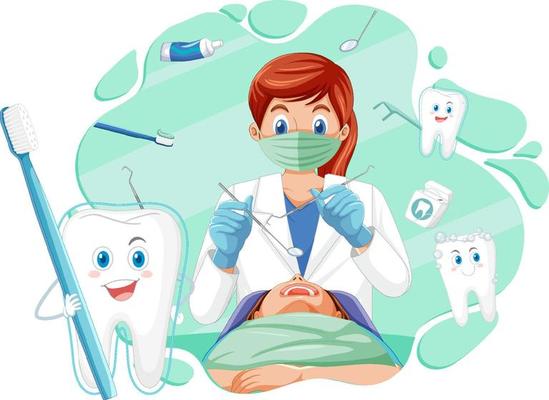Meet Your Friendly Area Dentist Eugene OR and Their Solutions
Meet Your Friendly Area Dentist Eugene OR and Their Solutions
Blog Article
An Overview to Typical Oral Conditions That Call for a Dentist's Treatment
Toothaches, for example, can be symptomatic of severe problems such as dental caries, cracked teeth, or abscesses, each requiring particular interventions like dental fillings or root canals. Affected wisdom teeth and jaw conditions can introduce substantial discomfort and problems.
Toothaches
Toothaches are a common dental problem that can vary from mild pain to extreme discomfort, typically showing a hidden concern that requires specialist attention. This pain can come from a variety of resources, including dental tooth cavities, broken or fractured teeth, and dental abscesses. Each of these conditions poses considerable dangers if left neglected, potentially leading to extra serious problems.
Dental tooth cavities, additionally known as cavities, are triggered by the accumulation of plaque that deteriorates tooth enamel, leading to openings or pits in the affected teeth. Abscesses are unpleasant infections at the root of a tooth or in between a tooth and the gum tissue, generally resulting from serious decay or neglected tooth cavities.
Effective therapy of toothaches entails resolving the root reason. This may include dental fillings for tooth cavities, crowns for cracked teeth, or origin canals and prescription antibiotics for abscesses. Early treatment by an oral specialist can stop more degeneration and reduce discomfort, ensuring ideal dental wellness.
Gum Tissue Disease

The main source of gum disease is microbial plaque, a sticky, colorless film that continuously forms on teeth. Poor dental hygiene, smoking, hereditary proneness, and specific clinical conditions, such as diabetes, can aggravate the danger of developing periodontal illness. Regular dental exams are vital for early detection and administration of this condition.
Therapy for periodontal illness ranges from expert oral cleansing and scaling to more innovative procedures like origin planing and periodontal surgical treatment, depending upon the severity. Preserving good oral health methods, including cleaning two times daily, flossing, and utilizing a disinfectant mouthwash, can considerably lower the danger of gum tissue illness and promote healthier gum tissues.
Cavities
Tooth cavities, additionally referred to as cavities, are an usual dental problem identified by the destruction of tooth enamel as a result of acid-producing germs in the mouth. These microorganisms thrive on sugars and starches from food and beverages, generating acids that progressively wear down the enamel, causing dental caries development.
Early-stage dental caries may disappoint symptoms, however as they proceed, they can cause toothache, level of sensitivity to hot or chilly, visible openings or pits in the teeth, and discoloration. If left unattended, cavities can pass through deeper layers of the tooth, potentially resulting in serious pain, infection, and even missing teeth.
Preventing cavities entails a mix of good oral hygiene methods and nutritional behaviors. Normal cleaning with fluoride toothpaste, flossing, and regular oral examinations are essential. Dental experts might likewise advise added precautionary procedures, such as fluoride treatments and dental sealers, to protect teeth from decay.
Therapy for tooth cavities relies on their seriousness. Minor cavities can be resolved with dental fillings, which bring back the tooth's structure. Much more advanced instances might call for crowns or even root canal treatment if the degeneration has reached the tooth's pulp. Timely intervention by a dental practitioner is important to avoid complications and keep overall oral health.
Impacted Knowledge Teeth
Influenced wisdom teeth are a prevalent oral issue that happens when the third molars, commonly described as wisdom teeth, fall short to totally emerge or line up correctly within the mouth. This condition typically results from inadequate area in important site the jaw or an uncommon development angle of the teeth. Impacted wisdom teeth can bring about a selection of complications, including infection, damages, and pain to adjacent teeth.
When knowledge teeth become impacted, they are often partly erupted or stay totally beneath the periodontal line. This partial eruption can create a pathway for germs to go into the gum tissues, causing infections that show up as swelling, discomfort, and even fever (eugene dentist). Additionally, affected wisdom teeth can apply pressure on neighboring teeth, potentially triggering crowding or moving
An extensive dental evaluation, commonly including X-rays, is necessary for identifying affected wisdom teeth. Treatment usually involves medical removal, performed by a dental specialist. The treatment intends to ease discomfort and prevent additional complications, such as cysts or damage to surrounding bone frameworks. Post-operative treatment is important to make sure correct recovery and lessen the risk of infection. Normal oral exams are suggested to keep an eye on the problem and keep oral health and wellness.
Jaw Conditions
Final Thought

Dental tooth cavities, likewise known as cavities, are created by the buildup of plaque that deteriorates tooth enamel, leading to holes or pits in the impacted teeth. Abscesses are unpleasant infections at the root of a tooth or between a tooth and the periodontal, typically resulting from serious degeneration or without treatment cavities.
Impacted wisdom teeth are a prevalent dental concern that takes place when the third molars, typically referred to as knowledge teeth, fall short to read what he said fully emerge or line up correctly within the mouth. Impacted knowledge teeth can lead to a selection of complications, including infection, discomfort, and damages to nearby teeth.
Additionally, affected knowledge teeth can apply pressure on surrounding teeth, potentially triggering crowding or moving.
Report this page